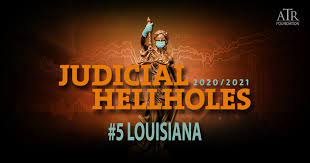NEW YEAR THOUGHTS FROM THE BAYOU STATE!
December 27th, 2021
Baton Rouge, Louisiana
NEW YEAR THOUGHTS FROM THE BAYOU STATE!
Do you make New Year’s resolutions? I always do. A New Year always brings with it promise and uncertainty, but this coming year brings with it a greater foreboding than we have experienced in the past. The Chinese have a saying: “May you live in interesting times.” But their definition means dangerous or turbulent. We in Louisiana and throughout America certainly live in “interesting” times today.
One resolution I make each year is to maintain my curiosity. It doesn’t matter how limited your perspective or how narrow the scope of your surroundings, there is (or should be) something to whet your interest and strike your fancy. I discovered early on that there are two kinds of people — those who are curious about the world around them, and those whose shallow attentions are generally limited to those things that pertain to their own personal well-being. I just hope all those I care about fall into the former category.
Another resolution is to continue to hope. I hope for successful and fulfilling endeavors for my children, happiness and contentment for family and friends, and for the fortitude to handle both the highs and lows of daily living with dignity.
Each year, I ask my children to give me two gifts for Christmas. First, I ask them to make a donation to a charity that will help needy families in their community. And second, I ask them to re-read Night, the unforgettable holocaust novel by Elie Wiesel, the Nobel Peace laureate who survived the Nazi death camps. I have a Wiesel quote framed on my office desk:
“To defeat injustice and misfortune, if only for one instant, for a single victim, is to invent a new reason to hope.”
Like many of you, our family welcomes in the New Year with “Auld Lang Syne.” It’s an old Scotch tune, with words passed down orally, and recorded by my favorite historical poet, Robert Burns, back in the 1700s. (I’m Scottish, so there’s a bond here.) “Auld Lang Syne,” literally means “old long ago,” or simply, “the good old days.” Did you know this song is sung at the stroke of midnight in almost every English-speaking country in the world to bring in the New Year?
I can look back over many years of memorable New Year’s Eve celebrations. In recent years, my wife and I have joined a gathering of family and friends in New Orleans at a French Quarter restaurant. After dinner, we make a stop at St. Louis Cathedral for a blessing of the New Year. Then it’s off to join the masses for the New Year’s countdown to midnight in Jackson Square.
When my daughters were quite young, we spent a number of New Year holidays at a family camp on Davis Island, in the middle of the Mississippi River some 30 miles below Vicksburg. On several occasions, the only people there were my family and Bishop Charles P. Greco, who was the Catholic Bishop for central and north Louisiana. Bishop Greco had baptized all three of my daughters, and had been a family friend for years.
On many a cold and rainy morning, the handful of us at the camp would rise before dawn for the Bishop to conduct a New Year’s Mass. After the service, most of the family went back to bed. I would crank up my old jeep and take the Bishop out in the worst weather with hopes of putting him on a stand where a large buck would pass. No matter what the weather, he would stay all morning with his shotgun and thermos of coffee. He rarely got a deer, but oh how he loved to be there in the woods. Now, I’m not a Catholic, but he treated me as one of his own.
New Year’s Day means lots of football, but I also put on my chef’s apron. I’m well regarded in the kitchen around my household, if I say so myself, for cooking up black-eyed peas as well as cabbage and corn bread. And don’t bet I won’t find the dime in the peas. After all, I’m going to put it there.
I’ll be back next week with my customary views that are cantankerous, opinionated, inflammatory, slanted, and always full of vim and vigor. Sometimes, to a few, even a bit fun to read. In the meantime, Happy New Year to you, your friends and all of your family. See you next year.
Peace and Justice
Jim Brown
Jim Brown’s syndicated column appears each week in numerous newspapers throughout the nation and on websites worldwide. You can read all his past columns and see continuing updates at http://www.jimbrownusa.com.





